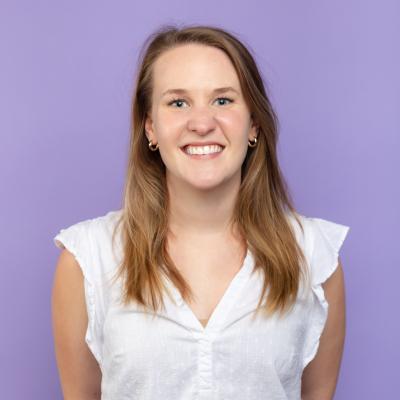1. What does a typical day at your job look like?
A typical day as a customer success manager (CSM) at Calendly looks like prepping slide decks for calls with customers, leading group product trainings and demos, strategizing for programs that will benefit our users and further their goals, and tracking the success of our current programs.
2. What’s the most exciting part about your work?
Working in a customer-facing role is exciting, because I get to be a part of helping other teams make an impact on the people they serve. Each day, I get to put myself in our users’ shoes to learn more about their use case(s) and how they can get the best return on their investment with our product. It’s also incredibly exciting to be a part of such a fast-growing SaaS (Software as a Service) company, and to get to be an integral part of building out our strategy for customer success at scale as we grow.
3. How did you find your job/what’s the best resource for jobs or networking you’ve found?
I am (and always have been) a huge proponent of LinkedIn. I found my current role partially through networking with my community and partially through finding the posting and eventually applying via LinkedIn. Throughout undergrad, it can feel like your whole network is other undergrads (or recent grads), but that very quickly changes when you get even a few months out of college. Utilizing LinkedIn as a launching point for growing and maintaining your network can be an incredibly powerful tool.
4. What’s the most surprising detour you’ve taken from your career path? What did you learn from it?
Straight out of Georgia Tech, I decided to take a position as a middle- and elementary-school French teacher. Even though I majored in ALIS with a French concentration, I never expected to go into teaching — in fact, I was directly opposed for quite some time. In the end, I decided to take a detour from what I thought would be a corporate career path to teach children a foreign language for two years.
While I only taught for two years before transitioning into tech, this experience was incredibly valuable for so many reasons. Working with kids and families, getting to share a love for another culture with young minds, and getting to be a part of so many young peoples’ lives in very formative years was an absolute honor. I would not trade this experience for the world! Furthermore, while teaching is admittedly an incredibly hard job, that role taught me so much about myself and gave me a plethora of hyper-transferrable people skills that I now use every day as a CSM.
5. How did studying in the School of Modern Languages at Georgia Tech impact your career?
While at Georgia Tech, I had the pleasure of participating in the Modern Languages Student Advisory Committee. Through this experience, I had the incredible opportunity to participate in a short-term consulting project for Delta Air Lines that was related to discovering best practices for commercial service to non-English speakers.
This short-term project eventually turned into an internship for me with Delta’s global innovation center (The Hangar), which to this day is one of the coolest job experiences I’ve ever had. If it hadn’t been for the School of Modern Languages and my incredible career advisor, I never would have gotten that opportunity, which ended up opening so many other doors to career growth within the tech and innovation space.
6. What skills did you learn during your studies that contribute to your daily life?
Even within the Ivan Allen College of Liberal Arts, students at Georgia Tech have a certain proclivity to view everything through an analytical lens. In this environment, you learn so much by osmosis of being surrounded by truly excellent, objective, solutions-minded thinkers.
While I was at Georgia Tech, I really did not consider myself to be an “analytical” person — but in my career, I’ve realized that couldn’t be farther from the truth. Even a small amount of Excel skills go a long way (in any job), and I’m very thankful that Georgia Tech provided an environment where having those skills was the expectation and the norm.
7. What’s the coolest research/project/initiative/event you worked on in Modern Languages?
Studying abroad with the French LBAT (Language for Business and Technology: France) program was one of the coolest experiences throughout my time at GT and definitely one of the best things for my language skills, as well. Shoutout to Dr. Cottille-Foley for organizing such a wonderful program!
8. What advice would you give to current modern languages students? To fellow alumni?
To any current Modern Languages students: it is okay to take a job that isn’t exactly the right fit. I know firsthand the pressure that comes from being at a high-achieving school, where peers are getting internships, co-ops, and full-time jobs left and right that appear to be such perfect fits. But I would encourage you to resist the temptation to compare yourself professionally. Sometimes it is okay to just take the next step, even if it isn’t exactly what you envisioned yourself doing at the outset. With each subsequent career move, you’ll have more opportunities to get closer to what you really would love to be doing long-term.
9. Can ML students and fellow alumni contact you to chat and network?
Absolutely! I would love to connect.
10. What are some things you can speak to and what is the best way to contact you?
Feel free to reach out to me via LinkedIn if you have any interest in a similar career path. If you’re feeling unsure about your career and need a listening ear from someone who was in a similar major, please don’t hesitate to reach out, and I’ll be glad to chat.
Meet more featured alumni in the School of Modern Languages!

